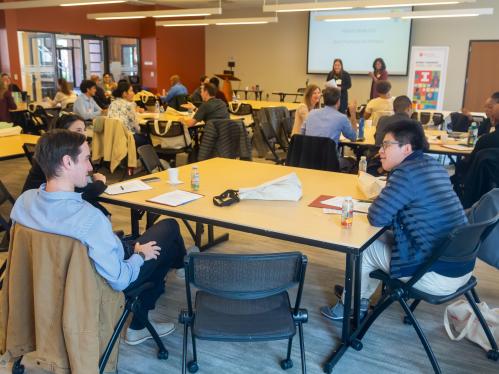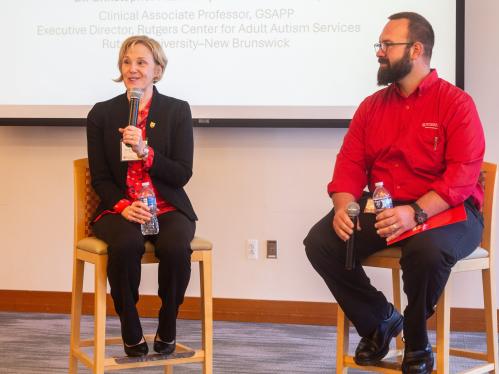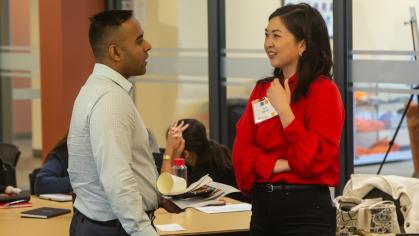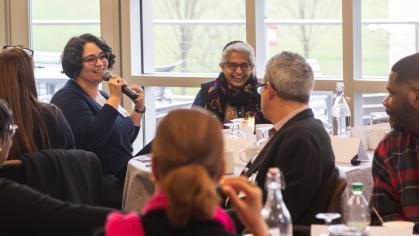
Here are a few books, journals, and articles that will help you on your journey to becoming a better mentor.

The Rutgers Connection Network (RCN) Faculty Mentoring Program is designed to increase the engagement and scholarly productivity of Rutgers faculty by providing the infrastructure, training, and facilitation to enable effective and collaborative mentoring partnerships beyond the departmental level.
All full time faculty are welcome to apply as either a mentee or to serve as a mentor.
To participate in the RCN Faculty Mentoring Program as a mentee, mentor, or peer-mentor, you are committing to dedicate about 2 hours per month for 8 months (from October to May). The program will be conducted hybrid this year with a mix of in-person and virtual activities.

Mentoring Orientation (2.5 hours in October: In person)
8 Monthly Mentoring Meetings (1-hour call or Zoom, Oct - April.) Pairs meet virtually or in person, once monthly, when convenient for them.
1 Virtual Mentoring Workshop (1.5-hour via Zoom )

You may apply to participate in one of two types of mentoring partnerships:
Are you interested in becoming a mentor? We encourage you to read through these FAQs before applying.
Approximately 10 - 12 hours over the 8 month long program, or on average 1.5 hours a month. The program runs from October – May, and mentors are expected to meet once a month virtually or in-person with their faculty mentee. In addition mentors are expected to attend an RCN orientation session, the annual FDC recognition ceremony and 1-2 optional events/workshops.
Faculty value the perspective of mentors in helping them progress towards their goals. Mentors help them think about priorities and how to allocate time across Teaching, Research and Service. Faculty mention that they value being connected with someone who has also navigated the path to tenure or promotion while dealing with challenging family situations, or departmental pressures. Faculty also appreciate having a mentor outside of their school/department to further extend connections at Rutgers and offer them another perspective to their role and struggles as a junior faculty member.
Form 1 (a) of the Rutgers Tenure and Promotion packet for Teaching & Research faculty asks faculty to list their contributions to Faculty Mentoring: Specifically: “Faculty mentoring (list by year, the faculty members you mentored and describe the mentoring provided)”.
And in the words of faculty mentors …
We take great care to ensure that our mentor-mentee matches are successful, and this includes working with an RCN Mentoring Platform, the Mentoring Executive Committee, and taking personal preferences into account.
Associate-level faculty and above are generally paired with junior faculty of the same track (Tenure or NTT), and Instructor or Assistant level faculty interested in providing mentoring are paired in peer-mentoring relationships.
We will always confirm your interest and availability to mentor in any particular year prior to matching you with a mentee or peer-mentor.
As this is a beyond the departmental level mentoring program, Faculty within the same department are not paired together for mentoring.
Full-time faculty of all ranks can join the RCN mentor pool at any time by creating a profile on the RCN mentoring site. Completing an RCN Mentor profile is not a commitment to mentor immediately. Prior to the start of any academic year, you will be contacted IF there is a faculty member who might be a good mentoring match.
Research shows that mentorship plays an important role in academic success by aiding researchers' well-being and career development.


Here are a few books, journals, and articles that will help you on your journey to becoming a better mentor.

The RCN program is committed to valuing the diverse populations we serve by cultivating effective mentoring practices such as culturally aware mentoring.

These are the leaders and champions behind the RCN Mentoring Program.
Join the FDC mailing list! Be the first to know about upcoming workshops and enrichment opportunities.